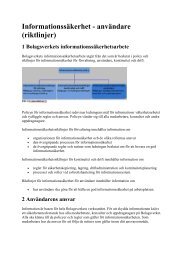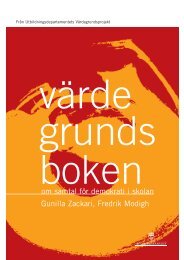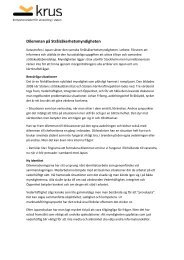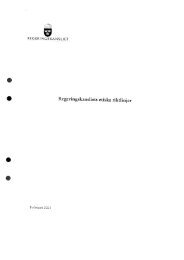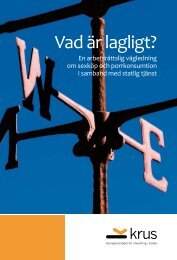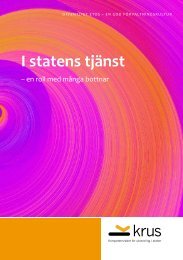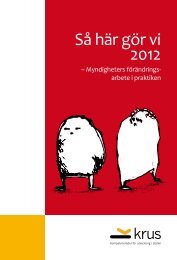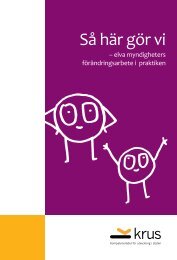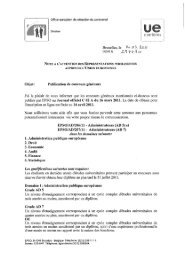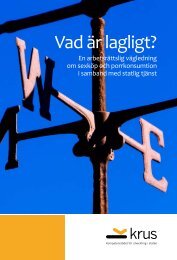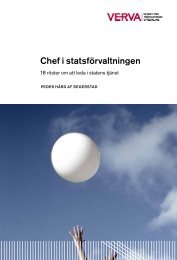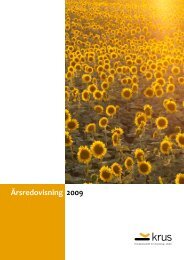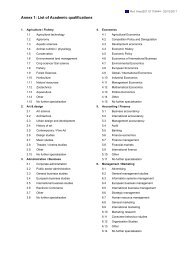Dialogkompetens i skolans vardag - Publikationer - LTU - Luleå ...
Dialogkompetens i skolans vardag - Publikationer - LTU - Luleå ...
Dialogkompetens i skolans vardag - Publikationer - LTU - Luleå ...
Create successful ePaper yourself
Turn your PDF publications into a flip-book with our unique Google optimized e-Paper software.
Relation between tools used in action research and the ZPD 557<br />
this medium to share their experiences, and raise questions or ideas concerning the<br />
improvements being attempted in the classroom. In this case, the web dialogue was<br />
a ‘voluntary tool’ and it was open for everybody to discover the different ways in<br />
which the tool could be useful. After an initial year of trial and error, it became clear<br />
that participants found it hard to give challenges within the group, and responses were<br />
not infrequently of a confirmatory nature (Wennergren, 2004b). There are studies<br />
where participation in cooperative writing, as a part of a university course, have<br />
contributed to learning (Bonk & King, 1998; Dysthe, 2002).<br />
Facilitating<br />
Facilitating in this case refers to the involvement of a person from the university<br />
whose task it is to support a group of teachers. The purpose of facilitation includes<br />
the opportunity to reflect on activities in the classroom, as well as providing an insight<br />
into associated research possibilities. In this context, the pedagogical task for the facilitator<br />
may be seen as using different forms of scaffolding to guide the participants to<br />
search for different answers to their authentic questions, but also to challenge their<br />
thinking about practice. To develop new knowledge, the discussions include variations<br />
of perspectives in order to elucidate the difference between easy highways in<br />
zone 1 and taking on the role of someone searching for narrow pathways in the ZPD.<br />
The main point is to support the participants to become actors in the period of<br />
change. Thus it should be borne in mind that a facilitator (as an action researcher)<br />
challenges the academic tradition regarding concepts of competence and expertise.<br />
Inevitably, there will be different opinions if it is going to be possible to make everyone’s<br />
voice heard when the power relation, as in this case, is essentially asymmetric<br />
(Greenwood & Levin, 1998).<br />
Data processing<br />
The data used in this article were written texts made by 50 teachers participating in<br />
the school improvement project described previously. Over a period of three years<br />
these teachers sent written descriptions and reflections to one another and to the<br />
facilitator. In total, this was done six times, and some of the material that they<br />
produced was subsequently analysed during the facilitation sessions. Furthermore,<br />
data were taken from the shadowing documentation and the network conversations<br />
that were held separately in the seven groups (groups A–G). Bearing in mind the<br />
assurances of individual anonymity given to the participants, views expressed by<br />
individuals are in this article referred to in terms of the group to which they<br />
belonged.<br />
The analytical process started after the first meeting of the project. After each<br />
occasion, the written descriptions and reflections of the participants, together with<br />
those of the facilitator (one of the researchers/authors), were analysed by the groups.<br />
Separate groups made written conclusions for each period.<br />
The final concluding analysis was made by the two researchers/authors:



